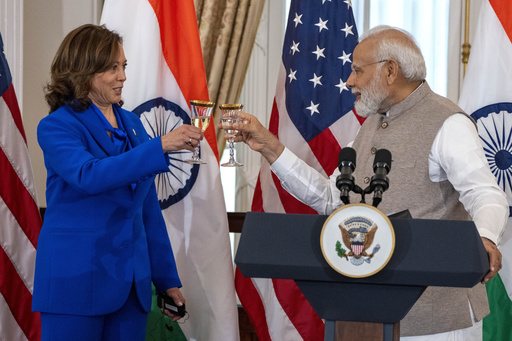NEW DELHI (AP) — When Kamala Harris was sworn in as vice president in the U.S., residents in her maternal family’s ancestral village in southern India watched in real time, setting off fireworks, holding up portraits of her and wishing her a long life.
But, four years later, as she works to become the Democratic nominee for president after President Joe Biden ended his campaign, reaction across the country has been more muted. While some residents in the capital, New Delhi, expressed pride when asked about her this week, a handful wondered who she was.
At least partially, that could reflect how Harris — who is also Black, with a father born in Jamaica — has treated her origins.
“Harris doesn’t wear her Indian roots on her sleeve, choosing instead to emphasize her Jamaican heritage,” Michael Kugelman, director of the South Asia Institute at the Wilson Center, said.
As vice president, she has deployed stories of her ties to India at key moments — at times light-heartedly — but her policy portfolio has been more domestic and did not focus on relations with India, he said.
In June last year, when Indian Prime Minister Narendra Modi made a state visit to Washington, Harris spoke emotionally about her ties to her late mother Shyamala Gopalan’s country of birth. She credited her grandfather P.V. Gopalan, who was a civil servant, with teaching her about what democracy means as they walked hand-in-hand on a beach in his home state of Tamil Nadu.
These lessons, she said, “first inspired my interest in public service … and have guided me ever since.”
She also talked about her mother’s influence — and how she discovered her “love of good idli,” eliciting laughter from the crowd with her reference to a dish of steamed rice dumplings, a staple in southern India.
Sumanth Raman, a political commentator in Tamil Nadu, said there was excitement when she was named the VP nominee, “but after that, there’s not been a great deal of enthusiasm.”
Since Sunday, when Biden dropped out of the race and endorsed Harris, she has hardly featured in media reports in the state, he said.
“The coverage has been more about Joe Biden dropping out, that’s what has grabbed headlines here,” Raman said.
Beyond a smattering of references, analysts say Harris hasn’t tapped her Indian identity heavily.
Today, few members of her extended family remain in India. Other than the trips during her childhood, Harris hasn’t visited the country much — and not since she became vice president, another reason that could explain why her candidacy hasn’t resonated widely in the country yet.
Still, if Harris becomes the Democratic nominee, it would be a first for a South Asian American — and a sign of just how far the diaspora has come in the U.S., Kugelman said.
Harris and a slew of other political personalities with roots in India — from Nikki Haley and Vivek Ramaswamy to Usha Vance — have become household names in the U.S. and their rise has put a spotlight on the country, beyond the cliches of Bollywood and Indian cuisine, he added.
But the impact of a potential Harris presidency would be much greater for American politics and the Indian American community than for India-U.S. ties, experts say.
“When Indians look at Kamala Harris, they’re looking at an American official more than someone of Indian origin,” said Happymon Jacob, a professor of diplomacy and disarmament studies at the Jawaharlal Nehru University.
That she was vice president did not have a substantive impact on India-U.S. ties, which are expected to grow over shared concerns about China regardless of who wins the November election, he said.
Modi, for instance, was feted with a glitzy state visit last year hosted by Biden, where both leaders affirmed that ties between the two countries were thriving. But the Indian leader was also close to former President Donald Trump, who received an adulatory reception when he visited India in 2020 as more than 100,000 people packed into a cricket stadium to see him.
“So I think there is a reality check in India, that these things don’t really matter at the end of the day,” Jacob added.
Even if a Harris presidency is unlikely to affect policy toward India or carry geopolitical implications, for Hindi literature professor Shivaji Shinde, it would still be a historic and meaningful moment for the nation.
The “United States is the most powerful country in the world. If they choose an Indian-origin person as their president, then it will be a huge moment for India and every Indian would be immensely proud,” Shinde said in New Delhi on Tuesday.
The news has also made its way to Thulasendrapuram, the village where Harris’ mother’s family once lived.
“We’re overjoyed to know that someone who traces her ancestry to our village might become the president of the United States,” said resident Sudhakar Jayaraman.
He said villagers performed prayers at the local temple, which Harris and her grandfather once donated to, after they heard the news.
“For a person of Indian descent with Tamil roots to reach such a high office makes us all proud,” Jayaraman added.
___
Associated Press journalists Sibi Arasu and Piyush Nagpal contributed.
This website uses cookies so that we can provide you with the best user experience possible. Cookie information is stored in your browser and performs functions such as recognising you when you return to our website and helping our team to understand which sections of the website you find most interesting and useful.
